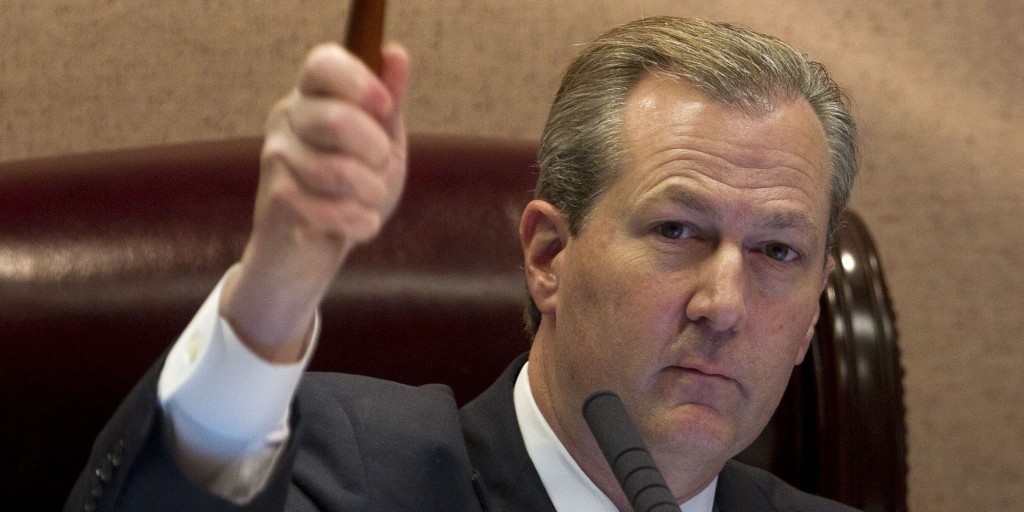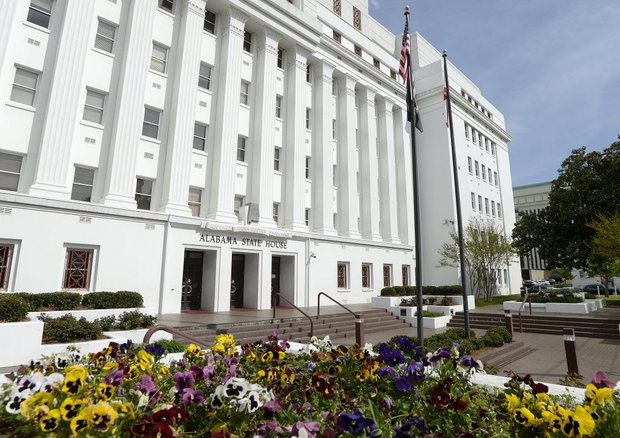House speaker warns against chasing “phantom” funds in state budget

In recent weeks, proposals to tackle state budget reform have floated through the Statehouse as lawmakers explore options to correct Alabama’s fiscal woes. The argument, according to Sen. Gerald Dial who wrote the most recent reform bill, is that the state has enough money to pay its expenses if only lawmakers weren’t bound by earmark provisions and the walled-off nature of the education and general fund budgets. Dial explained the situation just before the Senate finance and taxation committee voted on Senate Bill 502. “I’ve heard it said that one of the problems we’ve got in this state is that we’ve got earmarking,” Dial said. “We’ve got almost $3 billion in Heritage Trust Fund. Just think what we could do [with that money]. Without earmarks, there’s enough funding in this state to fund government for more than five or 10 years.” That’s an issue House Speaker Mike Hubbard seems willing to explore. This week, Hubbard announced a new Commission on Earmarking and Budget Reform to study the state budget process, including earmarking, appropriations, spending oversight, and the fact that Alabama is one of only three states with two separate budgets. That commission’s findings won’t be available to lawmakers until the 2016 legislative session. Meanwhile, Hubbard is raising concerns about pursuing “phantom” money when considering proposals to unify the state budget. In a recent radio interview, Hubbard explained his position on efforts to pull the reported $300 million to $400 million surplus in education funding to ease pressure on the general fund. Unifying the budget “doesn’t create more money in the immediate term,” Hubbard said. “And the only way that is going to fix anything is if we were spending too much money on education. I don’t think we’re spending too much money on education. We have put some measures in place […] — the Rolling Reserve Act — that forced this Legislature and future Legislatures to have the discipline to not spend every amount of money that we think we’re going to have.” In a presentation to lawmakers in March, the Legislative Fiscal Office projected a $287 million surplus in the Education Trust Fund and a $290 million shortfall in the General Fund. Some have questioned whether the practice of claiming tax revenue for the Education Trust Fund – then creating a barrier between the education and General Fund – is the root cause of the state’s current budget shortfall. Senate Bill 502 would create a single state budget and remove earmarks within the budget so that lawmakers and agencies could prioritize expenses. Several lawmakers, including Sens. Cam Ward and Rodger Smitherman, have raised concerns that a unified budget would allow Medicaid and corrections expenses — currently walled-off in the Alabama General Fund — to eat through funding for public schools. According to Hubbard, those concerns are valid because the surplus isn’t there. “That’s just money we created that we’re not going to appropriate,” he said. “If you take that and move it over, that violates the principle that we were saying: that we’re not going to be like the Democrats and spend more money than we have. “That so-called surplus? It’s phantom money,” Hubbard said. “This is money that is projected that we will have. It’s not sitting in a bank somewhere, this is money we think is going to come in between now and the end of the next fiscal year.” As lawmakers prepare for a possible Special Session, Hubbard cautioned against relying on an education surplus for long-term budget planning. “There’s some in our House who think we ought to do that — particularly the new guys who just came in. […] Anything above the cap, we said we would spend on nonrecurring capital expenses or one-time expenses because we don’t know whether it’s going to be there the next year or not. To get the General Fund dependent on that money is doing nothing to solve the long-term problem.”
Budget deal still elusive in final days of regular session

Alabama Today is hearing that as we round out the end of the Regular Legislative Session the plan is to be in session two days this week, three days the next week, then skip a week, and finish the week after that. Then, of course, it’s looking like a Special Session is inevitable to address pending budget proposals. This schedule has not been finalized but is what members and staff are talking about. The Legislature is no closer to reaching a budget deal that both the House and Senate will pass than all session, and they might as well be worlds apart. Thanks to some strong-willed and principled members in the House they weren’t able to bring to a floor vote the tax increases Gov. Robert Bentley and Speaker Mike Hubbard wanted. It doesn’t look like that’s going to change in the next several weeks. That doesn’t mean the discussion about those issues or new ones are dead. We’re hearing lots of talk about possible tax proposals for the Special Session, including a soda tax. Despite loud protests to the contrary, the budget passed by the House was not intended to be the final version. It was the House punting to the Senate, so the governor can breath easier and put his veto pen down for a moment. Check back for updates on the schedule and proposals to solve the budget crisis.
Mike Hubbard defense claims prosecutorial misconduct
Lawyers for indicted Alabama House Speaker Mike Hubbard on Wednesday tried to buttress claims that the case against the powerful Republican was tainted by politics. During a hearing they had a radio host and a legislator describe calls they got from a lead prosecutor in the case. Hubbard faces 23 felony ethics charges accusing him of using his political offices for personal gain. Hubbard is seeking to dismiss the charges for prosecutorial misconduct. Lee County Circuit Judge Jacob Walker has yet to rule on the motion while he sorts out whether the defense can question multiple employees of the attorney general’s office. During a court hearing, talk radio host Leland Whaley and state Rep. Mike Ball described telephone calls they received from Deputy Attorney General Matt Hart after Hubbard was arrested in October. Both said Hart called them unsolicited to discuss statements they made on air that they thought the case was politically motivated. “He told me that he was angry with me for saying that I knew for a fact that the prosecution was tainted by politics,” Ball testified. Ball, a former state trooper, said Hart indicated he called him because of his background in law enforcement and that Hart got “very loud” during the call. In an odd bit of courtroom drama, Hart questioned Ball on the witness stand, giving contrasting recollections of their 44-minute conversation. The exchanges became heated at times. Hart questioned Ball about his characterization that he was angry. “Do you remember I used the word ‘disheartened’?” Hart said. Ball said Hart was loud enough on the call that his wife could hear him across the room. Whaley said he received a similar call from Hart that he partially recorded. Although both Ball and Whaley said they considered it strange to get a call from Hart, they said he did not discuss the details of the investigation. Ball said he did believe that Hart was trying to convince him Hubbard was guilty. Prosecutors objected to the testimony, arguing that there was no misconduct because Ball and Whaley are not witnesses or have any other role in the case. Hubbard’s defense is also trying to question 17 current or former members of the attorney general’s office. Walker has not yet ruled on prosecutors’ request to block those subpoenas. White said the judge has determined a process for deposing those witnesses outside of the public courtroom. Defense lawyer Mark White said Ball’s testimony was a “smaller piece of the puzzle.” “Prosecutorial misconduct is very, very difficult to locate and find because so much of it is internalized,” White said outside the courtroom. “What you essentially had was a prosecutor lobbying a representative who is not in his district to take action on the speaker remaining as speaker and to take a political position.” Prosecutors have accused Hubbard’s defense of trying to manufacture a bogus narrative of misconduct and of mounting a “fishing expedition” with the subpoenas to the attorney general’s office. “They have no evidence to support their claims,” Deputy Attorney General Michael Duffy told Walker. “That sounds like a fishing expedition to me. We don’t know what’s going on in the attorney general’s office, but we’d like to know because it could be helpful.” Walker seemed doubtful of one defense claim. Hubbard’s defense argued that Attorney General Luther Strange did not have the authority to select retired district attorney Van Davis to oversee the investigation when Strange stepped aside from the case. Hubbard’s defense was trying to subpoena any documents related to Davis’ appointment. Walker asked how that claim was any different than the one raised by Rep. Barry Moore, who was acquitted of perjury charges in a related case. Walker ruled that Davis was rightfully appointed to oversee that case. The judge told the defense team to seek the information through a discovery request rather than a subpoena. Republished with permission of The Associated Press.

